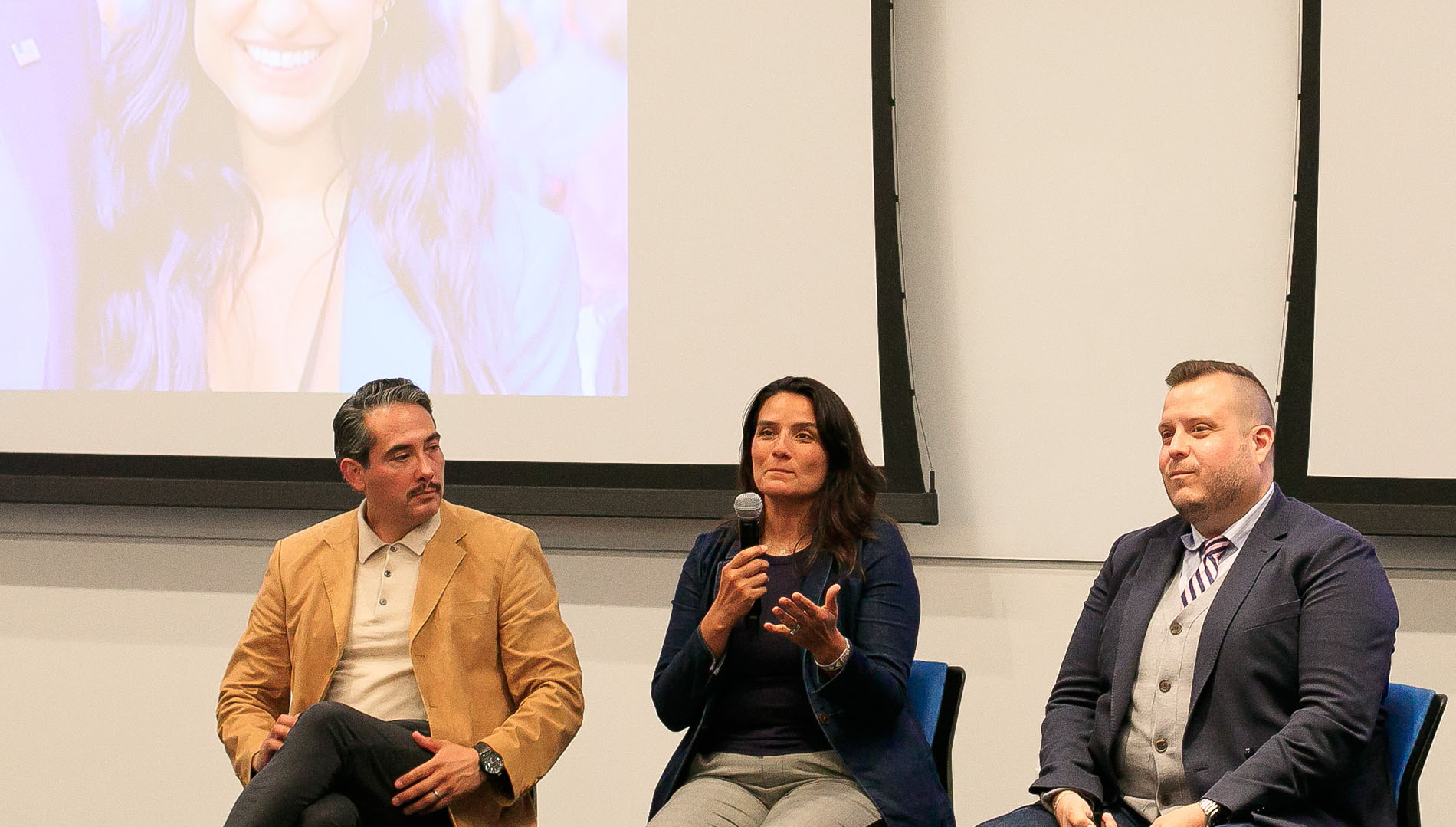
From left: Michael Méndez, Martha Guzman Aceves and Justin Ángel Knighten
Former federal disaster officials discuss protecting climate science
As we experience, as the moderator put it, “one of the worst years for the American scientific enterprise in modern history,” the UC Irvine Climate Collaboration, School of Social Ecology and its Social Impact Hub presented “Under Fire: Protecting Climate Science in an Age of Political Uncertainty” Oct. 28 in the Interdisciplinary Science and Engineering Building.
The moderator, Chancellor’s Fellow and Associate Professor of urban planning & public policy Michael Méndez, asked questions about what has happened and will happen to climate science with two former federal administrators who left their posts after Donald Trump was reelected president. Former Environmental Protection Agency (EPA) Region 9 Administrator Martha Guzman Aceves and former Federal Emergency Management Agency (FEMA) Associate Administrator Justin Ángel Knighten also had this in common: Both had worked for California governors, Jerry Brown for Aceves and Gavin Newsom for Knighten.
“Many of us understand that much of the work that we do here in the academy is under fire,” said Méndez after a warm introduction by Professor Brett Sanders, who leads the Climate Collaboration. “We intentionally named this event ‘Under Fire’ because all the things we hold dear in the academy are in flames or, as Brett mentioned, being threatened. This includes basic science, social science, research grants, funding, teaching and even our intellectual curiosity.”
He ticked off the amounts that have been slashed or frozen at the National Science Foundation, the National Institutes of Health, the Centers for Disease Control and Prevention and the U.S. Geological Survey as well as new threats against NASA and the National Oceanic and Atmospheric Administration. “According to the American Association for the Advancement of Sciences, this would result in essentially that end of the U.S.’s long-standing role as the world leader in science and innovation,” Méndez warned.
While not scientists themselves, Aceves and Knighten did in their respective federal roles translate scientific facts into health and environmental policy and regulations “Unfortunately, many of the projects they worked on can now be classified as being part of that long list of lost science,” Méndez informed.
Aceves, whose region spanned across California, Hawaii, Nevada, U.S. Pacific territories and 148 tribal nations or indigenous groups of people within each state or territory, said only the Golden State’s economy is strong enough “to really be able to invest in the continuation of policy and research” abandoned at the federal level.
Central California wastewater recycling infrastructure, which originally got the ax because it was part of environmental justice grants opposed by the administration, did have some federal funding restored, and the State of California is kicking in a chunk of money as well, Aceves says. However, she left office believing an energy project for the Hopi Nation in northeast Arizona was safe … until it wasn’t.
While some elected leaders oppose FEMA because they believe disaster relief and recovery should be the sole responsibility of state and local governments, Knighten countered that the scale of today’s climate change-induced calamities, cleanups and rebuilds is so massive, it can only be addressed at the federal level. Besides, he noted, “FEMA is also intimately connected to our national security.”
Asked by Méndez for steps states can take in the wake of the great federal pullback, Aceves mentioned California’s continued investment in renewable energy, while Knighten advocated for greater communication between states and their residents and business communities. “Sometimes we use language that is inaccessible to a lot of people or feels super overwhelming, and we don't really actually penetrate what we need to do to help them,” he said. “Understand and connect the dots, People are busy. Getting people to understand something is a huge hurdle.”
When the moderator sought advice for students working in the environmental space with community members, Aceves said, “I don't think it's overly complicated, really. It’s already starting with the humanity of the person. I think we'd like to go into some of these public forums and really start with the business at hand without taking the time to acknowledge the humans amongst us. … It’s an incredibly important practice actually just being human with other humans.”
A common perception of academics and federal officials among vulnerable people in hard-hit communities is these outsiders “parachute in” and impose their “ivory tower” views on locals, Knighten acknowledged. “You have a relationship to build with people,” he said. “You have to let them know that you are going to think about them while doing your research. … so that the research ultimately reflects their truth in a way that helps drive new awareness.”
When an audience member asked for climate science career advice, Knighten suggested looking not just at the public sector but the private and philanthropic sectors as well. “There are opportunities all across our society,” he said.
The last audience question concerned environmental recovery efforts for the EPA and FEMA themselves. Both guests reassured the crowd that given the national disasters now occurring every other day, the federal government will be forced to provide some level of action – though they suggested it may not look like or be as robust as we expect.
— Matt Coker
The discussion is available on YouTube